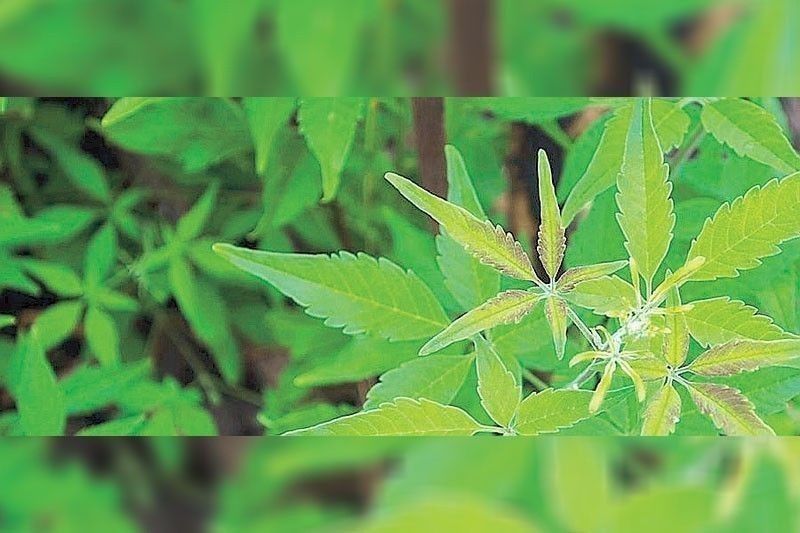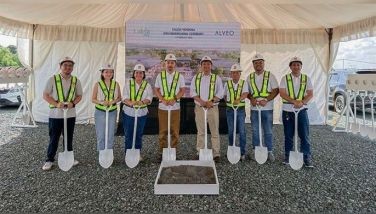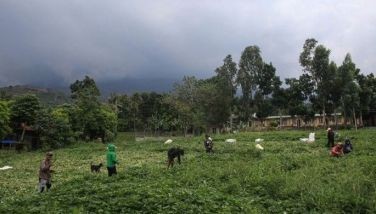UP researchers recommend lagundi for COVID-19 patients

MANILA, Philippines — Science Secretary Fortunato dela Peña has urged those afflicted with COVID-19 who are taking lagundi to follow the guidelines recommended by experts, particularly scientists from the University of the Philippines - Manila who had conducted a clinical trial on the medicinal plant as an adjunct treatment for the viral disease.
In his weekly virtual Bayanihan briefing, Dela Peña said UP Manila clinical trial team leader Dr. Cecilia Maramba-Lazarte had advised the public to follow prescribed dosage to ensure that the use of lagundi to treat cough symptoms of COVID-19 will yield positive results.
“Adult patients may take the 600-milligram tablet or 5 milliliters of the 600-mg syrup thrice daily. Meanwhile, the dosage requirement for pediatric patients would vary, depending on their age range. The 300-mg syrup may be taken thrice daily by children, following the suggested dosage per intake: 2.5-5 mL for ages two to four, 5 mL for ages four to six and 7.5-10 mL for ages six to 12,” Dela Peña said.
“Teens aged 12 and older may also take the 600-mg tablet thrice a day. Following these guidelines, the use of the medicine may alleviate mild COVID-19 symptoms, especially the loss of sense of smell for patients,” he added.
The Department of Science and Technology (DOST)-funded clinical trials on lagundi as an adjunct therapy for COVID-19, conducted by the Lazarte-led UP Manila research team, released positive results of their clinical trial in October last year, which showed that lagundi tablets administered to mild COVID-19 cases without comorbidities had relieved the various symptoms of patients.
Dela Peña noted that the lagundi plant-based formulations, which have been approved by the Food and Drug Administration (FDA), have long been used for cough and asthma relief.
Lagundi, according to the DOST chief, was included in the homecare kit for mild COVID-19 patients of the Philippine Health Insurance Corp. (PhilHealth).
FDA-approved VCO
As this developed, a group of coconut processors is already starting the tedious work of getting virgin coconut oil (VCO) approved by the FDA, with a lot of technical assistance by the DOST, for indications for mild COVID-19 cases.
VCO Producers and Traders Association of the Philippines Inc. president engineer Marco Reyes said their group has identified VCO makers that could join the first batch of applicants to submit applications before the FDA.
“Documentary evidence is needed together with the application. This will be provided by the DOST from their VCO versus COVID-19 trials,” Reyes told The STAR.
“What is being applied for is VCO as functional food for ‘disease risk reduction’ such as COVID-19,” he added.
VCO makers joining the first batch are those who had provided VCO samples used in the DOST clinical trials, according to Reyes.
“The reason is that they have already undergone prior screening in compliance with the Product National Standards and FDA permits such as license to operate and certificate of product registration,” he said.
DOST Undersecretary for research and development Rowena Cristina Guevara had previously said that the DOST’s Research Group led primarily by the Philippine Council for Health Research and Development (PCHRD) would provide technical as well as research and development documentation assistance to the group for the accreditation of VCO as an adjunct therapy for mild COVID-19.
“They will apply with the FDA for additional indications for VCO that it can be used for mild COVID-19,” Guevara told reporters in an interview late last month.
“It will require a huge amount of paperwork so it will take time,” she added.
Guevara pointed out that two finished research and clinical studies have already shown that VCO is effective in hastening the recovery of COVID-19 patients or can cure COVID-19 at “low viral load.”
One of the studies referred to by Guevara was the clinical trial on VCO as a functional food versus COVID-19 in Santa Rosa, Laguna that was conducted by the DOST-Food and Nutrition Research Institute. It showed that VCO, when added to meals of probable and suspected COVID-19 cases, shortened their recovery period by at least five days.
The study was published on May 25 last year in the international Journal of Functional Foods.
The other study, conducted by the Ateneo de Manila University and Duke University - National University of Singapore and led by professor Fabian Dayrit, yielded results that showed VCO was at least “helpful during the early stages of infection or at low viral load.”
VCO Philippines had earlier called on the DOST and the Department of Health to support moves to endorse VCO as a prophylaxis against COVID-19, not as a cure.
‘Solidarity trials for COVID vaccines’
The DOST-supervised Philippine-World Health Organization (WHO) “Solidarity Trials for COVID-19 Vaccines (STV)” clinical trials are now enrolling participants in 10 sites in Metro Manila.
Dela Peña said the 10 sites, which include eight government hospitals and two community-based locations, would be the centers for recruitment of participants as well as the vaccination sites for them.
The 10 sites were identified as the Philippine General Hospital, Lung Center of the Philippines, Makati Medical Center, Quirino Memorial Medical Center, St. Luke’s Medical Center, Medical Center Manila, Baguio General Hospital and San Juan de
Dios Hospital, while the two community-based sites are in Sampaloc, Manila and Crame, Quezon City.
As of Jan. 3, Dela Peña said 5,901 individuals have been vaccinated with the first dose while 3,840 participants have completed the two-dose schedule of the first study vaccine.
Guevara had earlier said four vaccines would be administered in the Philippine-WHO STV project, and these four are entirely different from the COVID-19 vaccines being administered in the nationwide immunization with emergency use authorization (EUA) issuances from the FDA.
“You have to remember, we are looking for vaccines that are, first, effective and safe; second, those that just need one shot and do not require multiple or booster shots in one year; and third, of course, those that are affordable to all countries,” she said in an interview with science reporters last Dec. 30.
“That’s why we are doing this ‘WHO Solidarity Trial for Vaccines.’ All the vaccines are coming from the WHO,” she added.
- Latest
- Trending


























